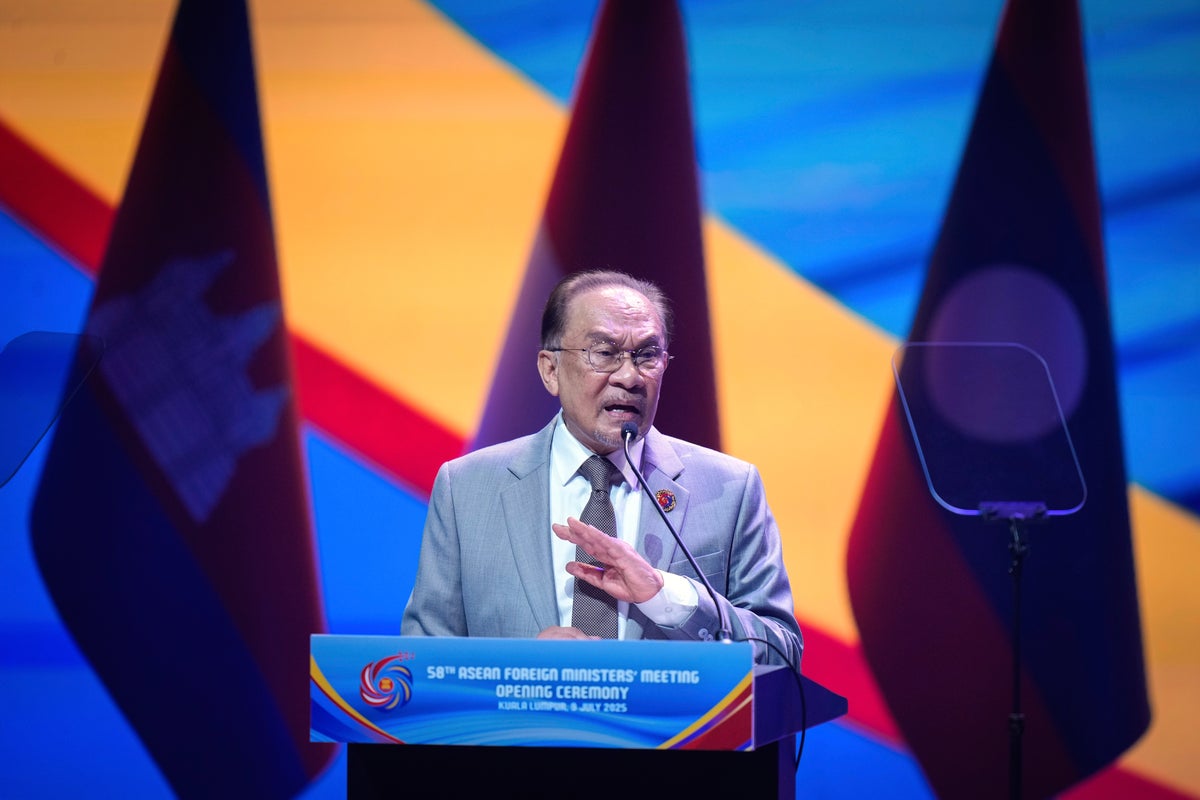From reproductive rights to climate change to Big Tech, The Independent is on the ground when the story is developing. Whether it’s investigating the financials of Elon Musk’s pro-Trump PAC or producing our latest documentary, ‘The A Word’, which shines a light on the American women fighting for reproductive rights, we know how important it is to parse out the facts from the messaging.
At such a critical moment in US history, we need reporters on the ground. Your donation allows us to keep sending journalists to speak to both sides of the story.
The Independent is trusted by Americans across the entire political spectrum. And unlike many other quality news outlets, we choose not to lock Americans out of our reporting and analysis with paywalls. We believe quality journalism should be available to everyone, paid for by those who can afford it.
Your support makes all the difference.
Read more
Malaysian Prime Minister Anwar Ibrahim warned Wednesday that global trade is being weaponized as Southeast Asia’s foreign ministers opened an annual meeting while facing the looming threat of U.S. trade tariffs.
The threat of U.S. tariffs has jolted the Association of Southeast Asian Nations, a 10-member bloc that includes some of the world’s most trade-dependent economies.
Six ASEAN members are among the 14 countries that could see duties on their exports to the U.S. skyrocket on Aug. 1.
Launching the Association of Southeast Asian Nations foreign ministers’ meeting, Anwar said the world is now witnessing an era where “power unsettles principle” and “tools once used to generate growth are now wielded to pressure, isolate and contain.”
Without mentioning the U.S. by name, he again urged ASEAN to work together to respond to trade threats.
“Our cohesion must not end at declarations,” he said, calling for members to increase intra-ASEAN trade, invest in regional integration, and reduce strategic dependencies on external powers. “This is no passing storm,” he said. “It is the new weather of our time.”
Trump first announced tariffs in April, but then delayed them for 90 days to allow for deals. On Tuesday, he announced new tariff with rates of between 25%-40% on 14 countries, which will go into effect Aug. 1 unless new deals are struck. He also threatened to increase tariffs if any countries retaliate.
Many ASEAN members have launched bilateral talks with the U.S., but officials have said they plan to hold an ASEAN-U.S. summit later this year to seek a common position.
So far, only Vietnam has secured a deal, bringing down its tariffs from 46% to 20%.
The list threatens 36% tariffs for Thailand and Cambodia, 32% for Indonesia, 25% for Malaysia, and 40% for Laos and war-torn Myanmar.
In addition to confronting trade fallout, the bloc faces mounting internal challenges. The ongoing civil war in Myanmar and a border dispute between Thailand and Cambodia are also on the agenda.
The gathering in Malaysia will be immediately followed by a series of critical meetings with ASEAN’s major trade partners, including the United States, China, Japan, Russia, India, and the European Union, scheduled for Thursday and Friday.
U.S. Secretary of State Marco Rubio, who last week cancelled trips to Japan and South Korea, will arrive Thursday for the talks on his first visit to Asia. Others visiting foreign ministers include China’s Wang Yi and Sergei Lavrov of Russia.
Analysts said these talks will test ASEAN’s ability to assert its voice amid escalating geopolitical tensions.
The bloc hopes to reinforce its commitment to a rules-based trade order while resisting pressure to align exclusively with any one global power.
“ASEAN must be among those who choose to stand for rules, even when others choose retreat,” Anwar said.
Analysts said Rubio’s presence signaled renewed U.S. engagement in the region.
It will be a reminder to “the region that Washington remains its most vital economic and security partner,” said Collins Chong Yew Keat, a foreign affairs, strategy and security analyst with Universiti Malay. But he said that U.S. support may now come with clearer expectations.
“Trump’s administration, while still offering the strongest military deterrence and market access, expects ASEAN to stop exploiting this security umbrella while cozying up economically to China,” he said.
